Okay So, Lemme Tell You About... No One Will Save You (2023)
An analysis and interrogation of the alien home invasion creature feature No One Will Save You (2023).
IMDB | ReelGood | Wikipedia | Does The Dog Die?
If you were excited for me to wax poetic about the latest alien movie, I'm sorry to disappoint you. I didn't like this one from top to bottom. I found it deeply frustrating and annoying. It's a visually stunning, well acted hot mess express. So if you loved this movie, you might wanna skip this one. It's okay, I get it. But if you want to see why I was so consistently rolling my eyes, keep reading.
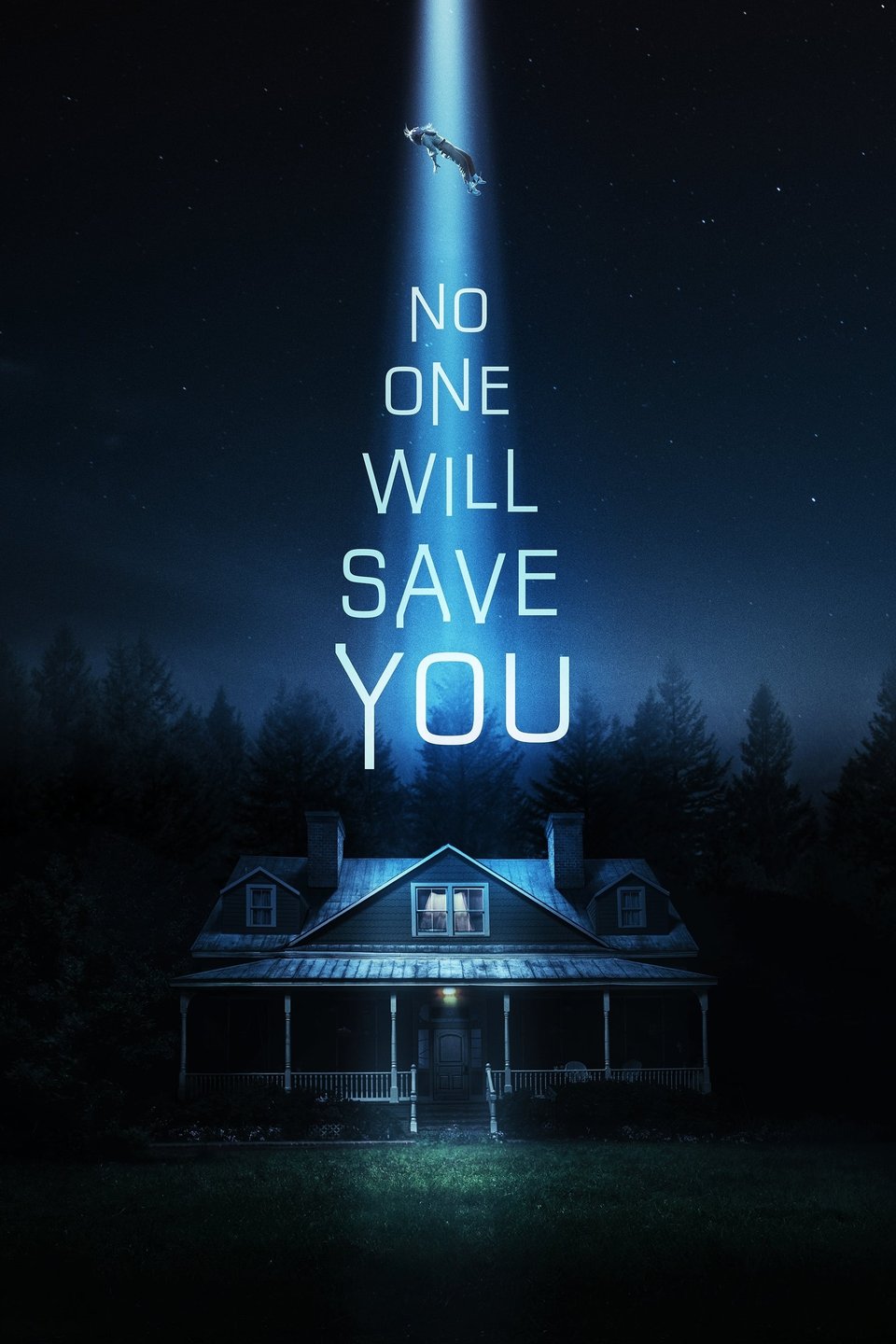
IMDB Summary: An exiled anxiety-ridden homebody must battle an alien who's found its way into her home.
My Summary: An unknowable legion with fantastical bio-tech insinuates itself into banal and anachronistic middle America life. I think I've seen this propaganda before.
Spoilers begin here! Check the ReelGood link above now if you want to watch the movie first!
This was a potentially interesting sci-fi movie that buys into and purports a lot of white nationalist ideology, seemingly without understanding how or why it got there, as it delves into the aesthetics of 50s Americana and taps just under its surface. Unfortunate and ultimately, I hope, forgettable. But we gotta get deep into the shits of what the aesthetics represent before we get too far in the weeds.
Background
My notes on the themes of the movie (before I decided I would share them with whoever wanted to read them) just read "I'm literally not going to be able to say anything nice here so we're not gonna say anything at all". That doesn't exactly hold up now. So let's get into it by doing a little quick history lesson.
Alien invasion movies and their variants were most firmly established in the 1950s in the US. World War II had ended and all the tech advances that come from that were making their ways into the hands of consumers. The suburbs were rising just outside of cities, growing just close enough to newly laid interstates for The Big City to be reachable but to not have to live there. The cars and kitchens and lives of the future were laid out just in reach, should you have the funds to be able to afford them. A whole world of automation and convenience that now you can find on sale was just starting to twinkle in the eyes of a burgeoning middle class. Even on TV, pristine perfection was reflected back with congenial smiles and problems solved in about 22 minutes or less. This is when Boomers came into being, this is the start of the realization of the American Dream. You know, for some very particular people.
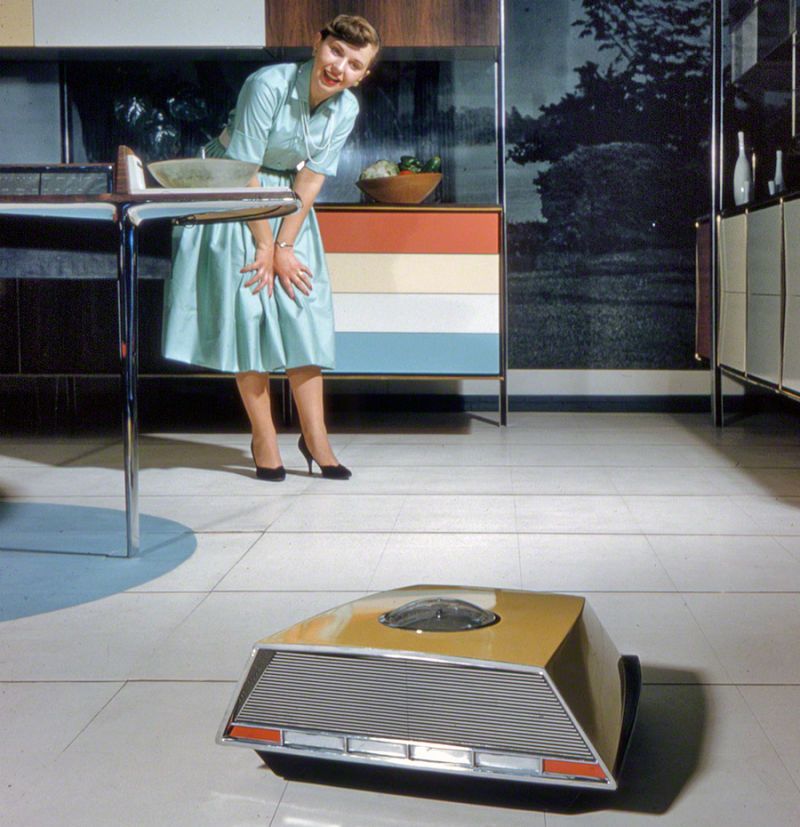
Then comes the challenges to that idyllic fairy tale. Brown vs. the Board of Education. Which led to a lot of private schools and white seclusion, especially in the South. The Civil Rights Movement in general, making cities feel to white people like they were being displaced (they weren't) as they rushed out to suburbs and white picket fences. Eventually fleeing further and further from cities as those they thought they'd left behind moved in next door, their own steps taken towards the national dream supposedly for everyone. The Cold War and Korean War. The "threat" of communism. Constant fear and paranoia. McCarthyism. The beginnings of being embroiled in unending international conflict under the thin veneer of protecting "democracy" and "the American way".
If that overall emotional arc sounds familiar, the ebb and flow of fear and fighting and disruption and hope and fear as your way of life is crumbled around you? That's because it's the same emotional arc of just about every alien invasion movie made in the US and some abroad. The trappings will change (and the trappings are what we're concerned with here) but that arc? I can't think of any times it's changed appreciably. (To be fair, this is also how more modern slasher movies flow too. But that's probably a whole other post about the construction of horror and how its emotional beats are meant to affect us.)
Themes & Tropes
So now let's get into the themes and tropes used in No One Will Save You and why, when they're mixed all together, it ends up being such a terrible fuckin' soup.
So we got Innocence and its Death front and center, flanked by the Unknowable Force and the Unrelenting Attacker. That's not where the problem is, that's pretty stock standard even in alien invasion movies. That's literally what Attack the Block (2011)'s formula is. And Aliens (1986). And Pacific Rim (2013). And even Independence Day (1996). The problem is where the metaphor of the Unknowable Force and Unrelenting Attacker land due to the aesthetic trappings of the movie. The styling and musical choices and even the physical shooting location all point us towards classic 1950s Americana. Patterned and flowy swing dresses and skirts or femme blouses and neat jeans with rolled cuffs and neutral shoes for our protagonist Brynn. Big sprawling country views and small town vibes for the location. The song we heard most often is "Knock On Any Door" by Ruby Murray from 1956, a song about how they may not have much in the singer's unnamed but thoroughly American hometown but they'll have hospitality for you no matter whose door you happen to find yourself at. Except we all know that has never really been true. And yeah, we're talking the 1950s I really briefly reviewed above. Which means the source of the fear is foreign technological powers, and more specifically communist powers: the former Soviet Union, China, and North Korea.
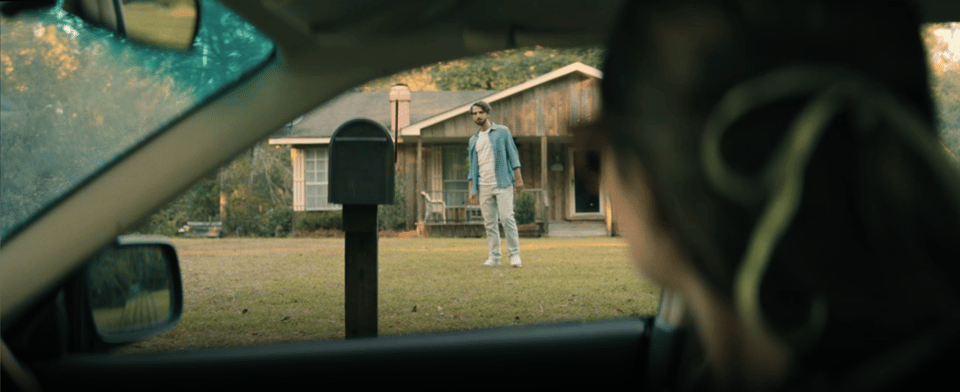
You may notice that two of those are East Asian countries. And extrapolating from that, you're probably starting to get why the stereotypical Grey Alien looks the way it does. A calm demeanor devoid of emotion with large dark eyes that always seem to end up slanted in their design language. A monotone "uniform" that weirdly usually tends to be just them being naked (unless it's something high camp like Mars Attacks!) and, because that's still nudity and this is still fairly puritanical America, they're completely stripped up sex characteristics and gender identity that in turn further strips humanity. When these Greys pause and rest (? maybe? who even can say if they're really resting), their poses end up resembling yoga pose holds, exaggerated by their elongated limbs. This is baggage in visual design language that should have been more deeply considered before being used. Or, in a much less generous reading, was exactly the point. This is a topic one could go on forever about and I don't think I'm the one to carry that conversation. But much like one should google names and acronyms before adopting them, check the history of your aesthetic tropes. Because you might be walking straight into some shit.
So the Unrelenting Attacker is pretty standard fare in the horror movie, especially slashers. Think along the lines of the fact that Freddy and Jason always come back for sequels no matter what awful ending they seemingly succumbed to previously. It's even been used in other media to incite the same thrill, like the Undertaker sitting straight up stiffly as a gong intones in the arena after taking what should have been a match-ending move. In the third Matrix movie, this is achieved by Neo fighting back an endless sea of Agent Smiths. If I were to have to give this a song, it'd be "Humans Are Such Easy Prey" by Perturbator, which borrows a line from The Terminator (1984) to open it. You know, the other famous one. The point is that nothing ever seems enough to actually stop these attackers, just hopefully enough to slow them down so maybe you can get away. Again, divorced from the other problems in the visual design language of the Greys and the other problems of this movie, this is an interesting take on the Unrelenting Attacker that utilizes my favorite part of XCOM and Pacific Rim's creature design: the purpose-built creature. Each specific design serves a purpose and can be deployed as needed. It implies both an understanding of the tools one may need and cold efficiency in the job that must be done. That second one doesn't do the problems of this movie any favors but the first one should have helped emphasize the demands of our antagonists. Sadly, for me at least, they didn't.
Now to my biggest problem that isn’t hopefully accidental racism or individualistic American exceptionalism: the Unknowable Power. We know nothing about the Greys or their intentions. Any best guesses are based not on what’s presented but the pop culture lexicon one has built up for themselves. Do they want land? Resources? Exploration? A base of operations for further invasion? Fun? Sport? Boredom? It’s on the shopping list? The constantly shifting implied motivations are impossible to find logic in. The Greys seem to wish to scout (the crop circle at the very start) then infiltrate and invade (the night time home invasion by the first Grey we see and the evidence that Brynn's home wasn't the only one visited). But then they begin an incursion of their own that same day. By the next, they’re down for some murder. Finally, after a whole lot of running, they give a free involuntary therapy session followed by whatever that ending was. At no point is it clear why they have chosen Earth. At no point is it clear why they have chosen Brynn. The Greys as an Unknowable Power have no reason to exist beyond plot device.
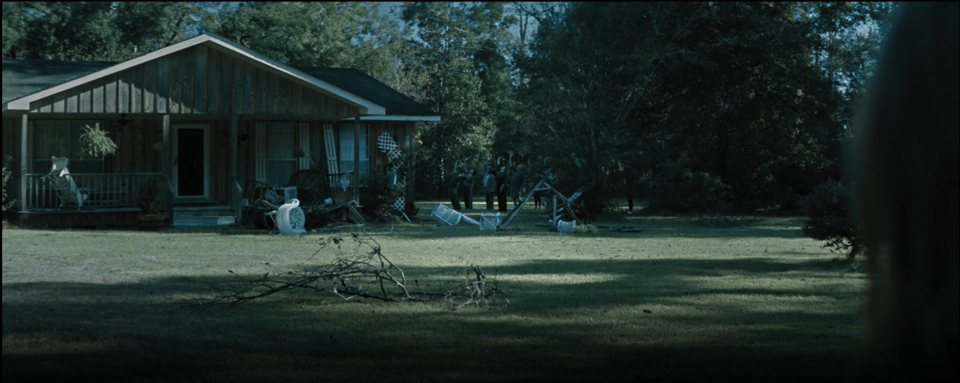
their motor vehicle's extended warranty...
To be clear here, the protagonists don’t have to understand what’s really going on. They simply have to understand their position. For instance, in the Predator franchise and especially Prey (2022), our protagonists all realize that they are being hunted for sport and their goals become to survive the ordeal. In the Alien franchise, the Xenomorphs' imperatives are to evolve and replicate. Most imperatives for creature antagonists (and a lot of horror antagonists in general) can be broken down into just a few verbs. What guides them there might need more explaining but it’s not always information that’s needed. We don’t have to know what the Greys are doing, but we should probably have some indication of why they’re doing it and that is what’s missing here.
Let's move on to Innocence and the Death of Innocence. Not like in Final Fantasy XIV, but trust and believe I got opinions on that too. Our avatar of Innocence here is also the main character Brynn, a troubled millennial who has been socially exiled from the town she lives in. There's some... weirdness I'll get into later with the narrative. But she is the only "good" person we have to connect with and, in fact, simply the only person we have to connect with. And as such, she's our measuring stick for who is worthy of sympathy. We find out by the end that she has never innocent and was responsible for her childhood best friend's death. She's a survivor for sure, but the audience is likely to question if she could ever truly be called a victim. If one could ignore the infinite other baggage and their related problems within the narrative, the question that this presents about the nature of innocence and what truly makes it could be a great one to explore. Can you be innocent and blameless when you were never given that grace? Is that an eternal, lonely burden you have to bear? Do you deserve it? Does anyone?
So why do these ingredients, if they’re so often used together or even just in the genre, coming together to make such awful fucking soup? Because nothing wraps the themes together in a satisfactory way.
If one were to say this movie is about forgiveness, then you’d have to question where it’s reflected back by the surrounding world. The perfect ending utopia around Brynn is proven artificial as the shot pans up to the saucers in the sky and fades out. No one, perhaps not even Brynn herself, has fully dealt with the trauma of the childhood incident. If the overall theme is of forgiveness, then this movie casts a bleak portent of how it can be achieved: only through total control even if you never asked for that control in the first place. The only coin that can buy back the freedom to smile and wave and receive like in return is utter dominance.
I’ve seen some say this is about millennial isolation and loneliness but, again, this movie has nothing to say about breaking that cycle and has none of the hope we’ve come to expect of horror by its end. The ending message is, once again, only full and unquestionable control. Community can’t save you, only your new friends’ technology can.
If the theme is just a reiteration of its title, then that is the only place in which it succeeds. It’s bleak and grim and devoid of even the glimmer of hope. And of that theme, I would then ask the director: if no one will save you (and in turn you will be able to save no one), is there a point in trying so hard to save yourself? Does anyone really want to be the person alone at the end of the world? What are you trying to say with this?
In some alternate timeline universe, there's a version of this movie that's about letting go of guilt and shame and embracing acceptance. It's no less creepy and it can even still have the home invasion beats. But it focuses on the community of the town much more deeply and tries to dig into the why of its decade-long grudge against a 12-year-old now 22/23.
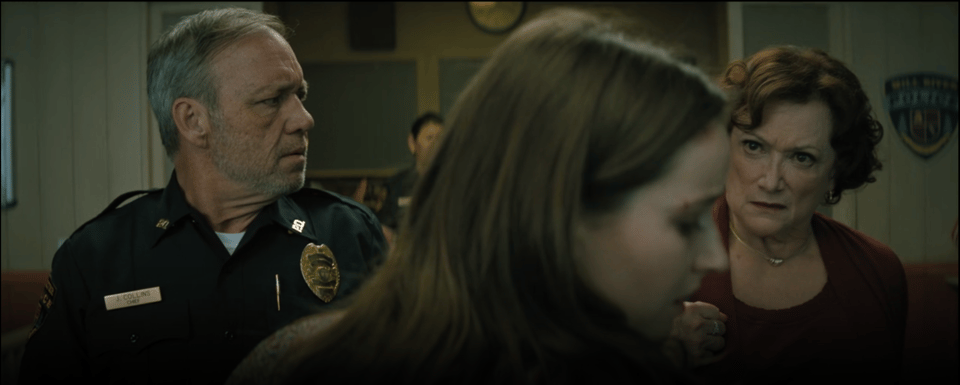
But also let me get into this small town drama.
Narrative
It's unclear if writer/director Brian Duffield simply wasn't fully aware of the tropes and stereotypes of white purity and innocence, the savage and unknowable invader, xenophobia, and straight cis white Christian values he was buying into when he created this story. No motive is given to the aliens, their goals seeming to shift whenever it's convenient for a twist. Brynn is only really likeable as a character in that everyone in the small town so vehemently hates her and she's got twee tumblr crafter cottagecore vibes. To me, it feels like the true horror of this movie lies in its simple ending acceptance of 50s era Americana as the goal for everyone. It feels like it wants to blame the struggles of Brynn not on the town's inability to move on from a tragedy, but on modernity itself. Everything would be so much easier if we could just go back to a "simpler time", even if that time was only simple for certain people.
Like I mentioned above, I'm much more interested in the drama of this small town by the 20 minute mark than I am in the following creature feature of stereotypical grey aliens terrorizing a white woman outcast. This town doesn't seem to work right, even for a small town. Everyone is still deeply upset over a tragedy that happened a full decade ago. Upset not in the way people are upset by old wounds, one that they've maybe partly processed but still hurts, but by fresh ones. No one talks to Brynn. At all. When someone finally does, it's after spitting in her face and cursing her name. The mail delivery person tosses her packages around for fun, trying to hit a Kobe off her mailbox. People avert their eyes if they see her seeing them looking at her. And it's not explained fast enough for it to really work. It just makes it feel like a town of assholes that refuses to get over its own hang-ups of something they most likely contributed to in a way they'll never accept.
Even if we never get a reasoning of why for the aliens, what's this woman really going to do? Save the town that despises her and blames her for the death of another child? Why? Not a single (living) person has given her any motivation to lift a finger for them! They'll most likely go right back to hating her! In the end, they don't even get a chance to maybe forgive her. Why not have her actually leave, start a life somewhere else, have some hope, and see her childhood friend's mother staring her down across the road as something moves in the mother's throat? The cycle of running begins again, but this time she has something and most importantly someone to fight for. No one would save her but maybe she could save someone else. Instead, the lack of rhyme or reason for why this is happening to her specifically (aside from the racist OG "evil communist Asian people will take over this country/the world from pure and innocent white people" bullshit) is our only viable explanation straight through to the credits. Clearly something is special about Brynn but we have no indications of what that is.
Some people have speculated that what's special about Brynn is that she's a naturally gifted killer which... I don't have to detail why that's bad, right? The theory is that while Brynn never intends to kill people, she's incredibly talented at doing it. She kills her childhood best friend with a single swing of a convenient heavy rock, which is hard to actually achieve. She kills the first Grey that makes their way into her home fully by accident, holding a sharpened piece of a diorama that had been broken by the asshole mail delivery person and nailing her alien tormentor in the head as they fling her around effortlessly. Every subsequent Grey that she encounters and chases her down meets a grizzly fate that she sort of just happens to be prepared for, as if she could sense what tools she would need to MacGuyver their demises. This trait, for some reason, is one that the Greys want. The interpretation of the ending, then, is that they have enshrined Brynn or gifted her the world for the achievement of being the Best Accidental Murderer in the Universe. Aside from being an extremely shallow reading, something about it doesn't land for me. Why then would the Greys care about her suffering? Why do they care about the rest of the town, beyond maybe using them as fodder for Brynn to prove her prowess? Why would they endanger themselves at all, rather than using camouflage to allow them to simply observe? To make this work narratively for me, this needs to be a wholly different movie and probably more akin to Resident Evil: Extintion (2007)'s opening than anything else.
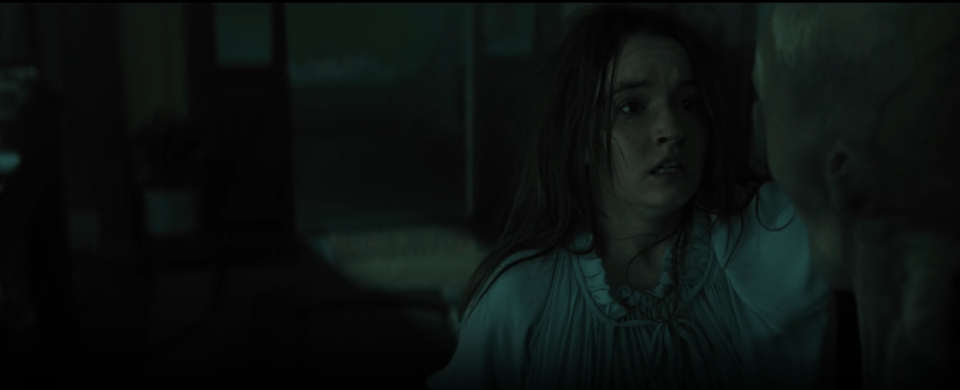
Some people have speculated that what's special about Brynn is that she's a naturally gifted killer which... I don't have to detail why that's bad, right? The theory is that while Brynn never intends to kill people, she's incredibly talented at doing it. She kills her childhood best friend with a single swing of a convenient heavy rock, which is hard to actually achieve. She kills the first Grey that makes their way into her home fully by accident, holding a sharpened piece of a diorama that had been broken by the asshole mail delivery person and nailing her alien tormentor in the head as they fling her around effortlessly. Every subsequent Grey that she encounters and chases her down meets a grizzly fate that she sort of just happens to be prepared for, as if she could sense what tools she would need to MacGuyver their demises. This trait, for some reason, is one that the Greys want. The interpretation of the ending, then, is that they have enshrined Brynn or gifted her the world for the achievement of being the Best Accidental Murderer in the Universe. Aside from being an extremely shallow reading, something about it doesn't land for me. Why then would the Greys care about her suffering? Why do they care about the rest of the town, beyond maybe using them as fodder for Brynn to prove her prowess? Why would they endanger themselves at all, rather than using camouflage to allow them to simply observe? To make this work narratively for me, this needs to be a wholly different movie and probably more akin to Resident Evil: Extintion (2007)'s opening than anything else.
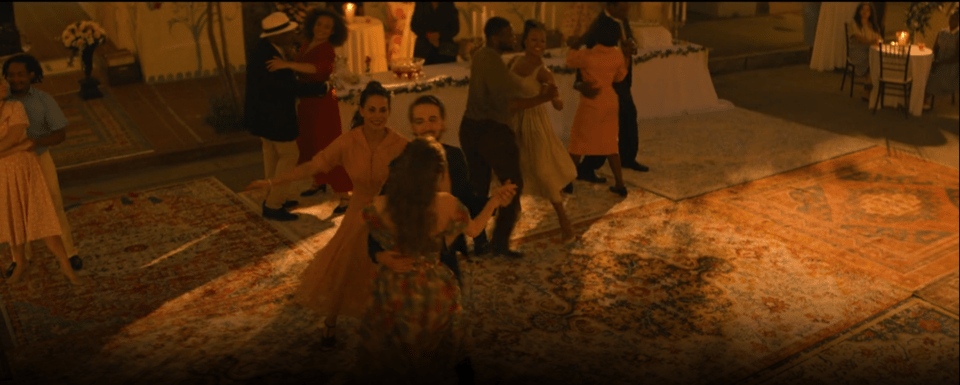
But also, there's something sinister about this that I can't quite explain.
If you can't tell, I don't think this narrative works. It feels like there are seeds for three separate and potentially interesting movies (a small town drama, a terrifying creature feature about survival, and... whatever that ending is trying to be) that end up tied together and curdling in my craw.
Other Notes
I think, more than anything, there's too little to be feared of Greys as we know them in pop culture for this movie to hit however it's intending to in the end. I think it wants to hit beats like Train to Busan (2016) (and probably Nope (2022), but I haven't watched it yet) but it doesn't do enough of the right worldbuilding to earn those notes.
This movie never does anything to earn the currency it's playing with and that it doesn't quite understand the implications of a movie that portrays a literal attack on "American country innocence" (or at least the status quo) by large and slanted bug eyed grey aliens that once upon a time were representative of white American xenophobic fears, specifically aimed at countries like China and Japan and foreign technological power. Do those fears still exist? Yeah, actually, though now they land more firmly on the technology itself than the peoples of east Asian countries as a whole. When you use humanoid aliens, you're drawing on a trope that has a LOT of baggage that should be carefully considered before actually drawing on it.
And that makes the choice of using Greys, the stereotypical alien that was once so empty of serious meaning and ubiquitous that it's printed on silly tee shirts and made into tacky toys (of all kinds, I know you seen some shit) so baffling to me! We've seen SO MUCH interesting creature design and this movie even draws on some for the variation of their Grey designs! How did we end up with less interesting designs than XCOM, which gave us snake ladies with exposed titties of all things?
What I Learned
I'll be honest, a lot of what I learned is what not to do and why. Why it's important to know and understand the history behind tropes. Why you should think through the various intersections of those tropes and how they can be interpreted today. Why you need to question and interrogate your own story to make sure that you're telling the one you actually want to tell. Even if people never see all of the work put in to a narrative, that doesn't mean that it's not worthy of care and consideration.
Wanna chat about this movie with me? Just reply to this email. Or say something on BlueSky. Or maybe I'll follow through with the TikTok post accompaniment to this and you can respond there. Who can really say!